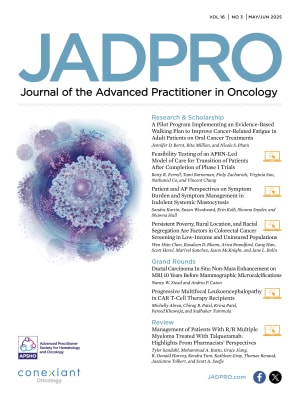Abstract
Distress is a psychological state that is often observed in patients with chronic disease. Many cancers are considered chronic in nature, with patients experiencing long, disease-free states and intervals of metastatic disease. Distress can negatively affect the biopsychosocial balance in cancer survivors and impede their progress along the cancer trajectory. Distress can also affect medical and psychological outcomes and hinder advancement into long-term survivorship. Distress may contribute to disease progression, although despite research findings, health-care providers seldom screen for indications of persistent or unresolved distress. This article discusses research findings related to the prevalence of distress in multiple chronic diseases. Validated instruments used to screen for distress in cancer survivors, such as the Distress Thermometer and symptom checklist from the National Comprehensive Cancer Network, are reviewed. With the availability of brief and concise instruments to screen for distress, providers have the ability to provide holistic and comprehensive care for cancer survivors. The overall financial impact of cancer-related distress is understudied, although similar psychological studies indicate that prevention or elimination of distress is beneficial. Cancer is a lifelong, chronic disease; patients have ongoing needs and varied sources of distress. As the number of cancer survivors exponentially increases, their psychosocial needs will likewise expand.





